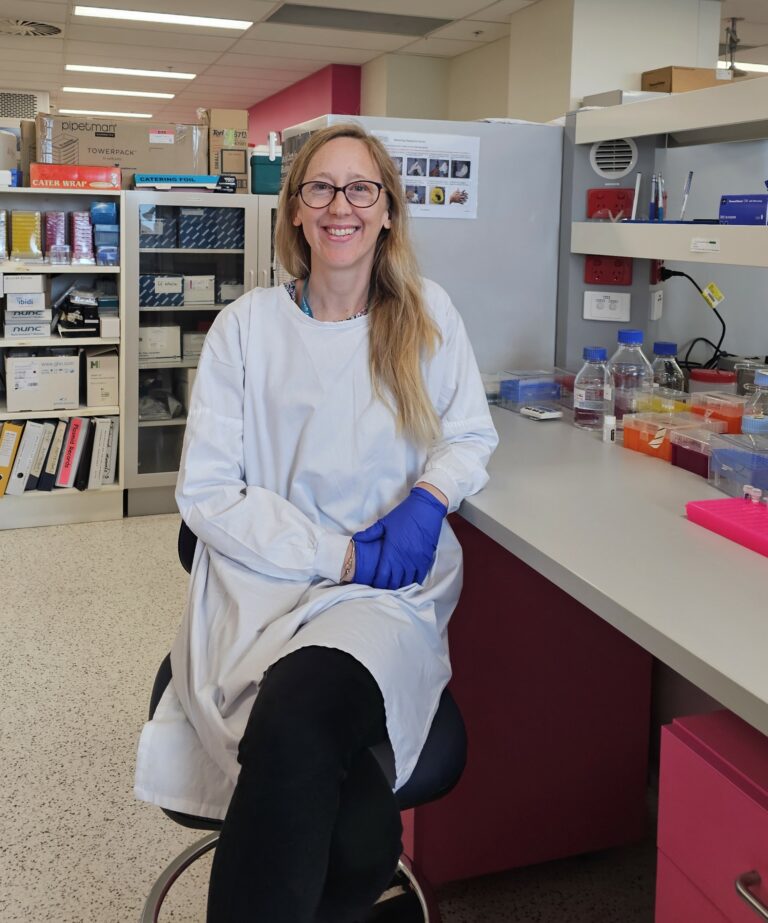As the inaugural Norman Beischer Scientific fellow, Reproductive Biologist and Geneticist Dr Elena Tucker, hopes to improve the diagnosis, management and outcomes of women with infertility. With the Fellowship’s $660,000 and based at the Murdoch Children’s Research Institute (MCRI), Dr Tucker plans to use state-of-the-art technologies to discover new genetic causes of a leading form of female infertility, premature ovarian insufficiency. Premature ovarian insufficiency is often likened to premature menopause and affects up to 4% of women before the age of 40. It is a devastating condition associated not only with infertility, but also increased risk of other health conditions such as mental health disorders, cardiovascular disease and osteoporosis. Current clinical guidelines do not recommend extensive genetic testing as part of patient care and most cases are deemed “idiopathic” without further investigation.
Dr Tucker, leader of the Ovarian Development and Disease team within the Reproductive Development Group at MCRI, has already discovered a number of genetic causes of this condition and has demonstrated how accurate genetic diagnosis can improve clinical outcomes. A genetic diagnosis enables appropriate genetic counselling, clear understanding of related health concerns, surveillance for these and early intervention. It also allows for the identification of affected family members before ovarian function is lost, enabling preservation of their fertility.
Dr Tucker’s research in reproductive biology and genetics has been recognised widely and she has been recipient of a number of prestigious awards, such as the Newcastle Emerging Research Leader award from the Society of Reproductive Biology and an International Rising Talent Award from UNESCO/L’Oreal. Her research has been published in leading journals such as Nature Genetics, Human Genetics and Endocrine Reviews, and she is ranked in the top 0.1% of researchers in the field of primary ovarian insufficiency (Expertscape).
With the help of the Norman Beischer fellowship, Dr Tucker plans to scale up her research to generate the evidence needed to support the introduction of genetic testing into routine patient care. Dr Tucker will recruit patients with premature ovarian insufficiency through her large network of collaborators including endocrinologists, gynaecologists and infertility specialists across Australia and abroad. She will study these patients using “multiomics” (which investigates all DNA, RNA and proteins) to identify likely genetic causes. To prove causation of these novel gene variants, in some cases she will perform disease modelling using flies (surprisingly many aspects of ovarian development and function are conserved from flies to humans!). In other cases, she will use patient stem cells to generate ovarian-like tissue in the lab to study further. These innovative disease models will provide insights into newly discovered genes and variants. Better understanding of ovarian biology, in turn, will fuel future research into the development of treatments for female infertility.
Dr Tucker will share her research findings via journal publication and presentations at national and international conferences. For example, in 2024 she has been invited to present at the European Society of Human Genetics conference and the International Menopause Society meeting. Stakeholder education is also an important aspect of her research program and she will share her findings with her clinician and patient networks, for example, by developing digital resources/fact sheets for dissemination. Dr Tucker is also involved in teaching the next generation of reproductive biologists with guest lecturer engagements at the University of Melbourne and Monash University and current supervision of three PhD students.
Dr Tucker’s research program, made possible by the Norman Beischer Fellowship, will lead to a better understanding of the causes of female infertility, will develop new models for future studies into treatments and therapies, and will lead to improved patient diagnosis and subsequent outcomes.
“I’m incredibly grateful to the foundation for making this important body of work possible. I believe that this work can lead to women having babies who would not have otherwise been able”.

Please use our account details below to make your contribution.
Account Name: Norman Beischer Medical Research Foundation
Bank: Bendigo
BSB: 633000
Account No: 5529128
Once the donation has been made please use the form below to let us know the details.